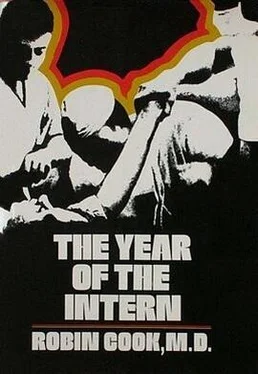“I suppose this business of not thinking about patients as people is the hardest to explain. Maybe a few doctors can empathize indefinitely. But not me. I can’t take it. To survive now, I want to know my patients only as gall bladders or hernias or ulcers. Of course, I include in that anything about them that directly affects their basic disease process, and I believe I am becoming a good doctor technically, but beyond that I don’t want to get involved. My system is not geared for it. I had this one patient named Roso, and I got so tied up with him that when he was discharged I was more relieved he was gone than I was happy he was alive.”
The silence was icy. I stared into the sky, purposely looking away from her. Then I went on.
“Another thing. Very important. As an intern, I’m exploited the same as an underdeveloped country operating under mercantilistic relations with a colonial power. For instance, all I do in the operating room ninety-nine per cent of the time is hold retractors, often for the sloppiest G.P., who shouldn’t be doing surgery, anyway. I’m there to be used. Anything I learn is in spite of the system, not because of it. And if I don’t do what I’m told, or make too many complaints about the medieval system — pouf! — out goes my chance to specialize in a good hospital. So when I say I’m scared about making a mistake, I’m worried not so much for the patient — although that’s partly it — but because I might get the boot and end up in some hick town giving typhoid shots. That’s medicine’s equivalent of the living death.
“And besides, a lot of very real and serious problems come up, which no one tells us about or even offers any advice. Like the emergency-room question of when you should try to revive a patient and when you should just let him alone. As interns with no experience, we’re totally vulnerable about such things. And this is not entirely a medical problem. What about the ethics involved? If the person is revived and becomes a brain-stem preparation — and that means he is taking up a sorely needed bed in the ICU — then you’ve deprived somebody else of the ICU bed, someone else who might have a better chance. That’s a godlike decision. Medical school never taught me to play God. And then all—”
I had been rambling on, looking out through the dark trees, putting these thoughts together for the first time. In some ways I was talking only to myself, and when I turned and looked at Nancy she exploded, stopping me in the middle of a sentence.
“You’re an unbelievable egotist!” she said.
“I don’t think so. I just live in the real world.”
“To me you’re an egotist — cold, inhuman, unethical, immoral, and without empathy. And those are not traits I look for in a doctor.” She could really lay it on when she wanted to.
“Look here, Nancy, what I’ve told you is the truth, and it’s not just my truth. I’m a composite of most of the interns I know.”
“Then the whole bunch of you ought to be thrown out.”
“Right on, baby! If you feel so strongly about it, why don’t you organize a sit-in at the ER? Compassion’s a cheap commodity when you get eight hours of sleep a night. Most nights I get less than half that much. The rest of the time I spend checking Mrs. Pushbotton’s itchy hemorrhoids. Don’t you moralize at me from your easy chair.”
And so it went, ending with both of us steaming with anger. I left after a halfhearted promise to call her sometime.
Back in my geometric, all-white room, I lay fuming, all keyed up, with less than nine hours before the ER holocaust was to begin again. Sleep was clearly out of the question. I called the lab, and Joyce answered. Could she come by at eleven? She said she would, and I felt better.
Day 307
General Surgery: Private Teaching Service
To an intern in medical practice during the latter half of the twentieth century, Alexander Graham Bell is the arch villain of all time. The blame, of course, must be spread a bit wider, to include not only the man who invented the telephone, but also the sadist who designed the ring. And then all those fellows working for Ma Bell who perpetuate the jangle — they’re in it, too. How did hospitals function before the invention of the telephone? I often thought of myself, nowadays, as a mere extension of that little piece of black plastic. It was every bit as terrifying as the ambulance, and a good bit more sudden — always somehow expected in the back of my mind, and yet at the same time coming on me unawares. In all the world, there is no sound like it for disturbing the peace.
My peace just then consisted of falling gently asleep beside Karen Christie in her apartment after, I trust, a mutually satisfying encounter. When the telephone rang at 2:00 A.M., we both reached. I let her have it — not because it was probably for her. Since I was on call, it would more likely be the hospital night operator extending me an invitation to return to those corridors. But it might have been Karen’s so-called boyfriend.
Indeed it was the hospital operator, who put me through to a nurse. “Doctor, would you come immediately? One of Dr. Jarvis’s private patients is having trouble breathing, and Dr. Jarvis wants you to handle it.”
Rolling over on my back, I stared at the ceiling and cursed inwardly, holding the telephone away from my ear. Dr. Jarvis I knew all too well. He was none other than our old friend the Supercharger, famous for his OR butchery, especially on breast biopsies. “Are you still there, Doctor?” the nurse intoned.
“Yes, Nurse, I’m still here. Does Dr. Jarvis plan to come in?”
“I don’t know, Doctor.”
Typical. Not only of the Supercharger, but of most private doctors affiliated with the hospital. The intern would go to see the patient, work up a recommendation, and phone the private doctor, who, of course, would tell the intern to do what he thought best. On most such occasions these guys didn’t even bother with the amenities. One time I had spent about an hour going over one of the Supercharger’s cases. When I called in my report. Supercharger had stepped out of his office and I had to leave a message with his secretary for him to ring me back. He rang back, all right, but to the floor nurse, not me. When she told him I wanted urgently to speak with him, he said he didn’t have time to talk to every intern in the hospital. Rush, rush, for a few more bucks — that was the Supercharger’s game.
Supercharger had another endearing habit. He admitted almost all his patients on the so-called teaching program. One might naturally think that a teaching program would in fact teach, at least a little. God knows, we interns were in need of it. In practice, the teaching program was a grim joke. It meant only that I or one of the other interns did the patient’s whole admission history and physical — the “scut” work. As a reward, we might be allowed to do the discharge note as well. But in between we weren’t allowed to fool with the orders, and in the operating room our contribution consisted of holding retractors, removing warts, and perhaps tying a few knots, if the doctor was in a condescending mood.
The ultimate in Supercharger’s gall had occurred earlier, on that breast biopsy, the one he mauled so badly. On the admitting chart, giving the particulars of the case, he had written a little note saying that when the house staff — meaning the intern — worked the case up, he was not to examine the breasts. Now, how was I supposed to do an adequate history and physical on a breast-biopsy case without examining the breasts? Farcical. And now he wanted me to pop over at two in the morning to straighten out another of his messes.
The nurse was still waiting on the line.
“Has the patient had surgery?” I asked.
Читать дальше












